Introduction
[00:00:00] Detective Ev: Hello my friends. Welcome back to another episode of the Health Detective Podcast by Functional Diagnostic Nutrition. My name is Evan Transue, aka, Detective Ev. I will be your host for today’s show on mental wellness.
You’re going to be listening to another live podcast that we did. And just so you know, this will not affect the quality ever. These live podcasts are not like the Instagram lives that we sometimes repurpose. If the content’s really good, the live podcasts are actually done through a separate program that records in super high-quality audio. In fact, if I never announced that it was live, you guys wouldn’t even know other than us engaging with some of the commenters that are on the live podcasts.
With that said, the live ones will always be about a week or two earlier than you hear it on the audio. That’s the advantage of tuning into our other social channels if you’d like to do that. But obviously everything that is done live will always be put onto audio, given again, about that week or two. Because you guys have been an amazing audience over the last three years, and we want to make sure that you get everything that you can possibly get.

Our guest today is Lucy McKeller. She is actually the new Executive Director for the Association of Functional Diagnostic Nutrition Practitioners. If you guys have heard Jennifer Woodward on the show before, I’m sure you have, that was actually her position previously. Jennifer is now our Business Director, and Lucy is doing this. But she also has a health story, which is why she’s on the show, right? I love people at the company, but you gotta have the health story, and she definitely has one.
Mental Wellness: Mind & Body Harmony
Now, Lucy’s life took an unexpected twist when she suddenly started experiencing panic attacks, seemingly out of nowhere. Growing up, she had a typical upbringing and now had a steady job and good friends. The concept of mental health wasn’t even on her radar.
Then one night she was jolted awake by a panic attack, convinced she was about to die. From that moment, her life became an upending cycle of fear, dominating her every waking moment. Desperate for answers, Lucy embarked on a 10-year journey through the labyrinth of mental health struggles, consulting numerous doctors, but finding no relief.

Ten years into her battle, Lucy uncovered a profound truth, the interconnectedness of mind and body. This revelation became the catalyst for her path to mental wellbeing. Through determination and self-discovery, she managed to regain control over her mental health, ultimately becoming an advocate for mental health awareness.
Well, she is a graduate of FDN as well. Obviously, that’s how you can get into these positions at FDN. We don’t hire outsiders. We actually hire people who walk the walk and have been through the program, which is really amazing. And it’s cool to get to hear her story.
She does not currently take on clients; she does like family/friend stuff. But this is just a person who wanted to share her story today to help others out. Without further ado, let’s get to today’s episode.
Mental Wellness: Lucy’s Health Story
Lucy, you’re going to be the third live Health Detective Podcast, even though we just went live with you the other day for you guys. Just to be clear, Lucy was coming on wearing a different hat the other day. She was wearing the hat of AFDNP Director, which she still is. You know, we haven’t gotten rid of her. She’s doing a great job. It’s just that we wanted her back for podcast guest hat now.
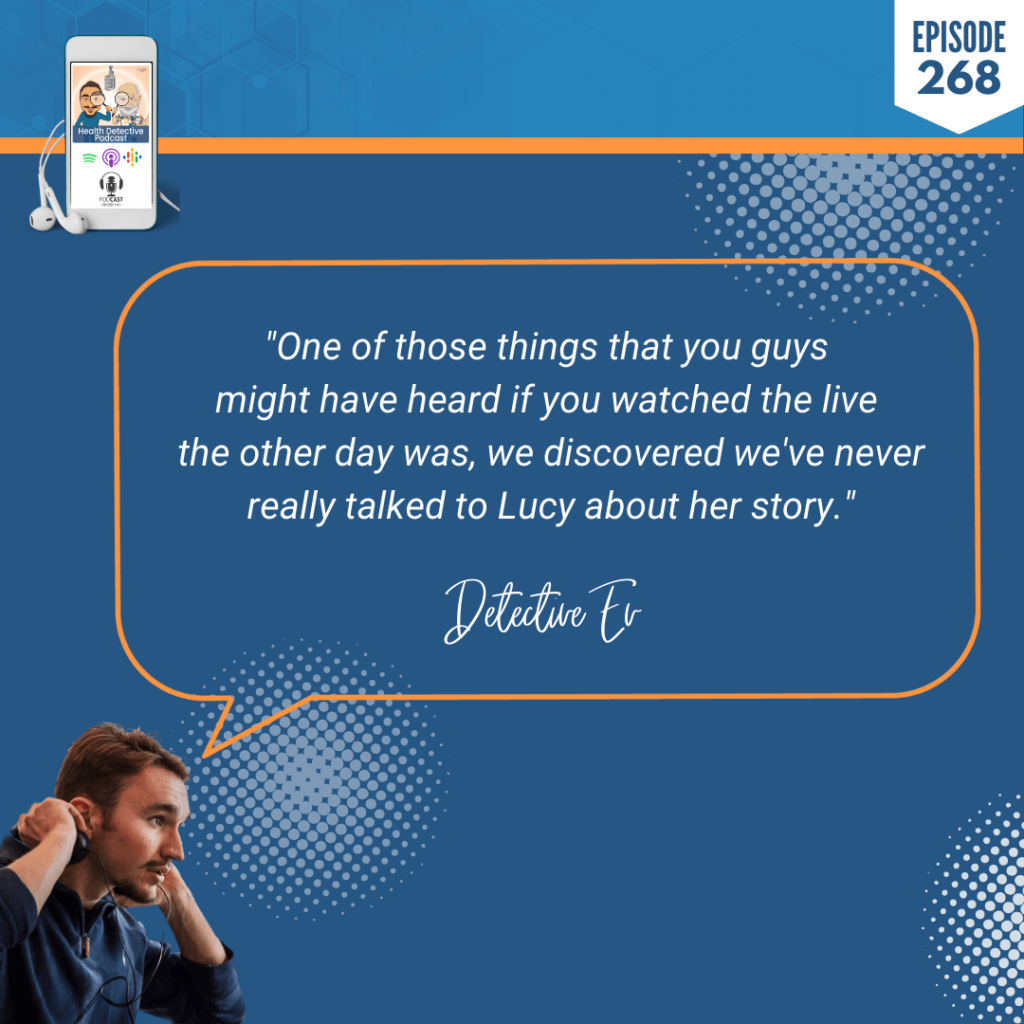
Because one of those things that you guys might have heard if you watched the live the other day was, we discovered we’ve never really talked to Lucy about her story. And I love having as many people in staff at FDN on the show because the majority of staff at FDN, even though we have 45, 50 people now with the contractors included, they are FDNs, and they support the company. It’s an amazing thing. So, we’re here to strictly talk about Lucy’s story.
What we’re basically doing is we want to go on YouTube, Facebook and have some fun with different audiences. So, we will be doing some of these live. Everything that’s done live is always going to go on audio as well. It’s usually just going to be a week later. This is the earliest place that you could ever catch a Health Detective Podcast. And if you wanted to catch a replay or just listen on Apple or Spotify, if that works better for you, all the audio versions will be available on our normal places about a week later. So, with that said, Lucy, welcome back.
[00:03:54] Lucy McKellar: Thanks. So excited to be here. It’s great to be here.
Mental Wellness: A Terrifying New World
[00:03:56] Detective Ev: Yes. I hate to be redundant, but especially for the audio people, some of these people are going to be listening and have no idea what we talked about live the other day. So, we will have to at least go through the first part of our conversation again, and then we’ll kind of expand from there.
The first question I always ask on this podcast is what the individual’s symptoms were and when did they start. This is under the assumption that you have a health journey. We already know this. So, what did those first symptoms look like and when did that begin for you?
[00:04:25] Lucy McKellar: For me, my first symptom was a panic attack. And then it basically didn’t go away for like 10 years.
Yeah, I was healthy. I believed I was healthy, completely normal, regular upbringing, whatever, regular job. I was just about to start a new job, so I went to bed early that night and woke up at around midnight having a panic attack. And I had absolutely no clue what was happening to me.
I had never experienced anything like it before, not really even heard the words “mental health”. Definitely hadn’t heard, like “panic attack”, “anxiety”, nothing like that. And yeah, I thought I was dying. Then literally overnight my entire world changed. Like, I don’t think I can put into words how much it changed.

I went to bed as a carefree, happy, confident individual, and when I woke up (I eventually got back to sleep and woke up the next day), my whole world was like nothing I had ever experienced. I was terrified, and I didn’t know what I was afraid of apart from having another panic attack.
Mental Wellness: A Constant Cycle of Panic & Fear
But I just felt terrified like something incredibly bad was about to happen to me literally from the moment I opened my eyes in the morning to when I eventually got back to sleep. Sleep became scary because of having the panic attack in my sleep. That’s kind of how my story started.
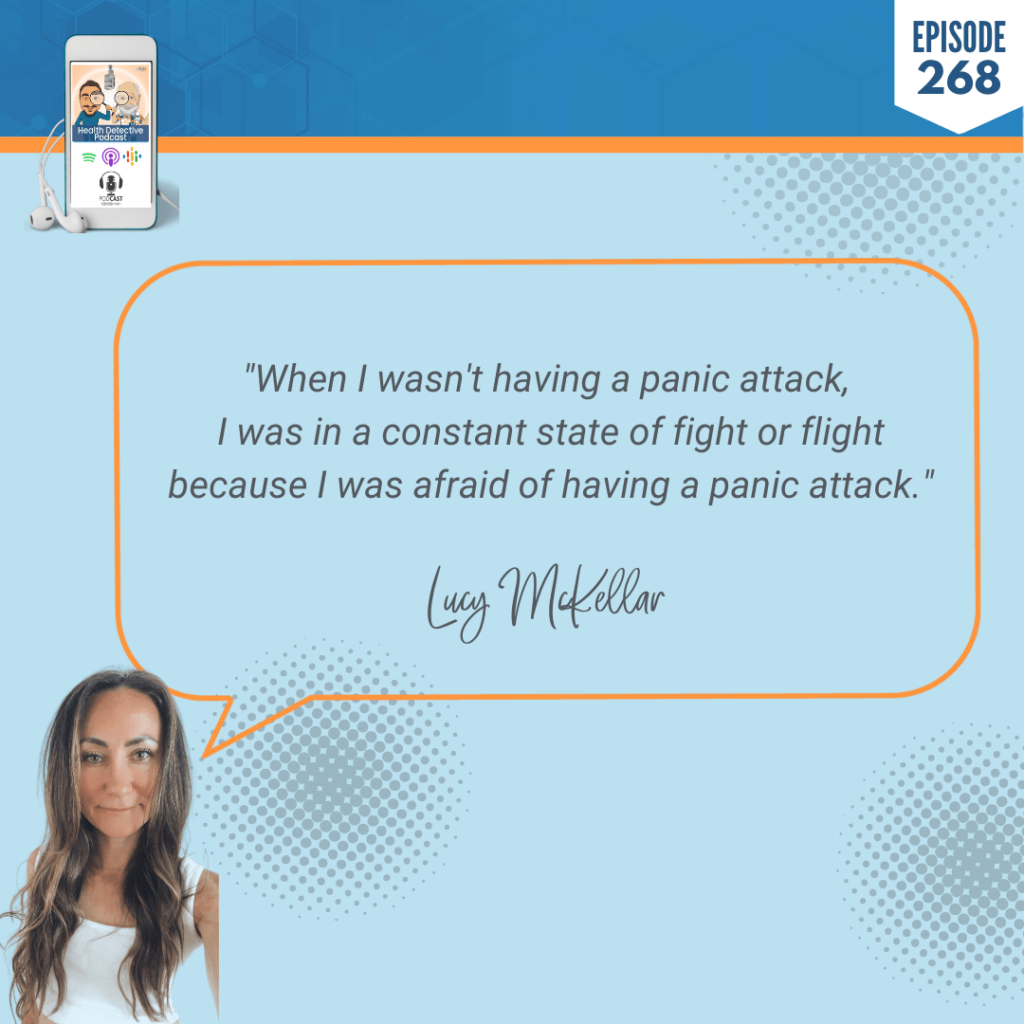
Basically, all of my symptoms were around mental health, especially the first three or four years. I was having multiple panic attacks a day, three, four panic attacks a day. And when I wasn’t having a panic attack, I was in a constant state of fight or flight because I was afraid of having a panic attack.
[00:06:11] Detective Ev: So, this involves even past panic attacks then. And listen, I don’t normally act like I know every Western medicine diagnosis in the world, but mental health is something I’m obviously very familiar with. That sounds like panic disorder.
Panic disorder, for those that don’t know, is when, obviously, you still have panic attacks, but panic disorder is characterized by this fear of the next panic attack. A lot of your life starts being revolved around making habits or making choices that will lead you away from what you think is going to cause the panic attack.
Unfortunately, for those of us who have dealt with this, and maybe it’s your first time listening, I dealt with very similar stuff to Lucy – that was my first health symptom. I might have had a few stomach aches before then, I think that’s what was starting to happen at like five. But panic attacks were the first like smack-in-the-face symptom where you’re like, whoa, something’s definitely wrong with this person. Even if you don’t know what it is, you know something went wrong.
Mental Wellness: A Disrupted Gut
But it wouldn’t be until 15 that the panic disorder came on for me, and it happened in the exact same way as it did for you, minus, I was already awake.
But when that panic attack came, for some reason, that was the one where it was so bad and so traumatizing, I went to the hospital. Every day after that for a long time became this obsession with what do I have to do or not do so this doesn’t happen again. It inevitably happens again; your life becomes kind of consumed by this.
Before we dive deeper into the mental health side, because you said those were really your main symptoms, I am curious. Prior to that point in your life, I think you said this happened in your twenties, is that correct?
[00:07:39] Lucy McKellar: I was 24.
[00:07:42] Detective Ev: Okay. So, did you have any other health things prior to that? And I mean even stuff like did you get migraines? Were you on 20 courses of antibiotics or something for sinus infections each year? Were you overall pretty healthy?
[00:07:54] Lucy McKellar: At the time, yes. I wasn’t taking any medications or anything like that.
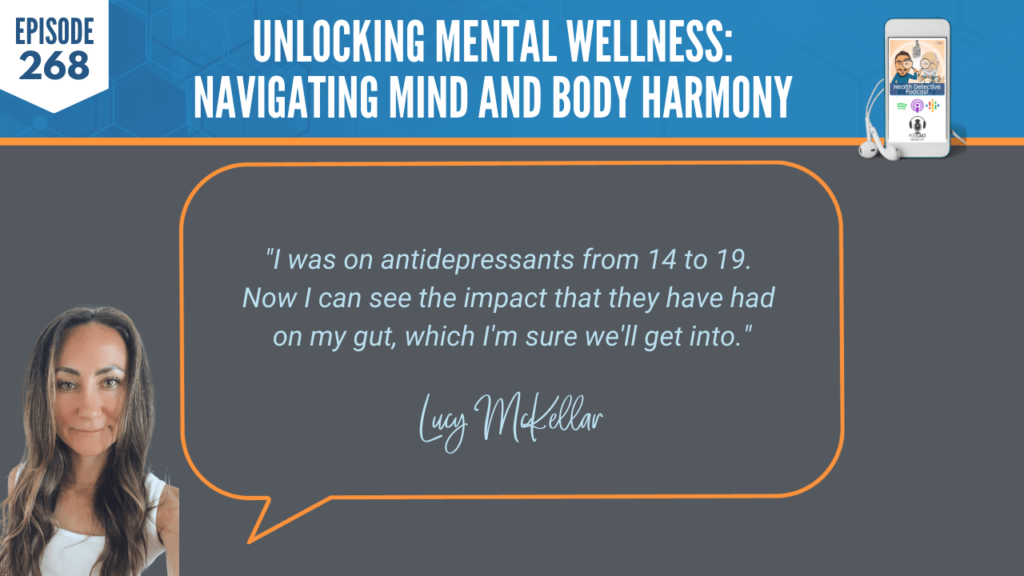
Now, looking back, I was actually put on an SSRI when I was a kid for something completely unrelated to mental health. I had ME, which is like post viral fatigue syndrome. It’s basically where you are tired all the time and everyone thinks you’re making it up, but it’s an actual illness. So, I had that as a child. I was on antidepressants from 14 to 19. Now I can see the impact that they have had on my gut, which I’m sure we’ll get into.
Mental Wellness: Antidepressants
I believe, even though I wasn’t taking anything at the time, I do think that that had an impact. But it wasn’t the actual illness itself; it’s more like what they prescribed me to deal with it that I think had the bigger impact.
[00:08:49] Detective Ev: Sure. I know that they hand those things out like candy, the antidepressants, but that one even I can’t figure out. So, what’s the logic there? Why do they give that for this condition?
[00:08:56] Lucy McKellar: That specifically was prescribed to me because I was struggling to sleep, and it was meant to help with my sleep. I was 14 years old, and the doctor and my mom were like, hey, you need to take these. So, I was like, okay. Plus, I was 14, so I was like, oh, I’m on antidepressants now. My life is like really hard. This is like an attention thing. It is going to be great.
But I didn’t take them properly because I was a kid. I was like taking them on an empty stomach. And as I got older, I was drinking when I was taking them. It makes me cringe thinking about it. Yeah, I think that had a really big impact.
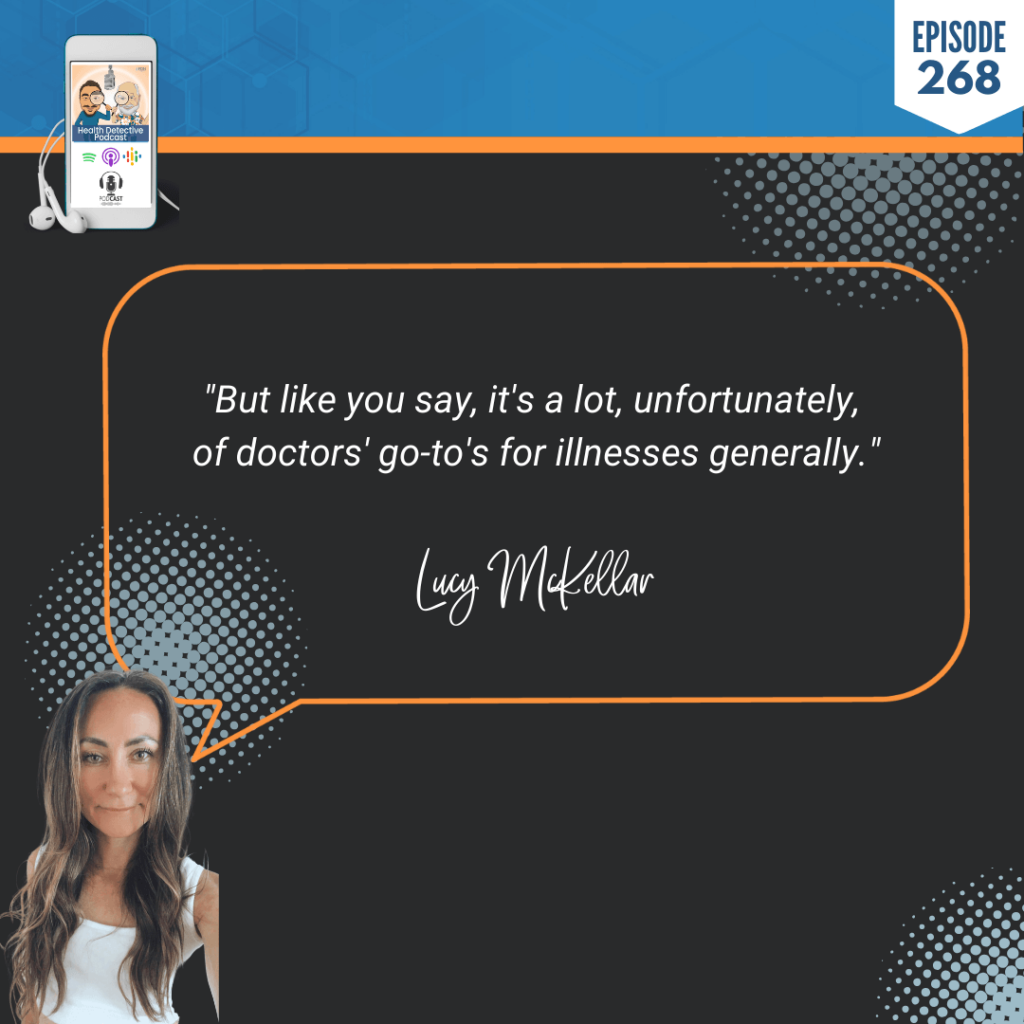
But like you say, it’s a lot, unfortunately, of doctors’ go-to’s for illnesses generally.
[00:09:40] Detective Ev: Yeah. Well, it’s insane to me. I realized this as a kid because of certain stories. I’ll word this one very politically correct.
A teenage friend of mine when I was also a teenager, you know, you’re starting to get interested in girls, you’re dating and stuff, things are happening. And there were certain things that he had some issues with.
Mental Wellness: Amitriptyline
He said that the doctor gave him this Zoloft stuff to help him perform better is what I will say. I looked that up and found out that they gave a teenager Zoloft so he could do his thing more because it makes you numb to a lot of sexual sensations. I’m like, what? Like, I thought that was crazy back then.
Then you get older and realize they’ll give this for gut stuff, they’ll give it to adults for those issues. Now, an adult is going to have the intelligence to not tell their friend that they’re on that for that reason. Teenager, little bit of more of an open mouth when they have a few drinks. So, you learn a few things about your friends.
But they throw these things out like candy and they’re not particularly free of side effects. It’s like, holy crap. Why are we doing this to people? In fact, jokes aside, the whole reason that that worked for my friend is because it is a side effect, that it makes people feel numb to these things.
[00:10:55] Lucy McKellar: I was on something called Amitriptyline. I don’t know if it’s available in the US. Obviously, I was in the UK at this time, so I was put on Amitriptyline.
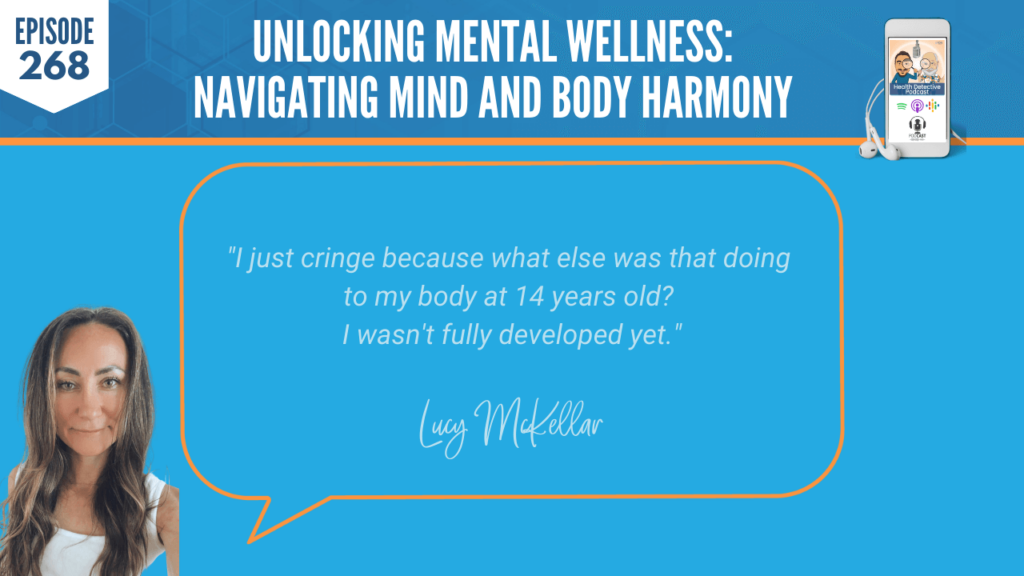
The side effect is drowsiness. They put me on a high enough dose so that I would be affected by that. And I just cringe because what else was that doing to my body at 14 years old? I wasn’t fully developed yet. My hormones were going crazy as it was. I just can’t imagine the impact that it had at the time. And they just hand them out.
That was their solution when I first started having panic attacks.
Mental Wellness: No Options
They were like, take these pills. No one used the words “mental health” when I went to the doctor, or “panic attack” or “anxiety”. He literally just wrote me a prescription and was like, this will help you sleep. Obviously, I was having the issues with falling asleep because I was afraid of having a panic attack.
I took the prescription and I think I did it for like two days. Honestly, it made my panic attacks worse. When I called the doctor, she was like, oh yeah, it will make you worse for about two weeks before it makes you better.
[00:12:03] Detective Ev: By the way…
[00:12:05] Lucy McKellar: Yeah, talk about preempting.
And I was like, I don’t want to do this. This is awful; I feel horrendous. But I don’t want to go through what I went through when I was a kid. I was like, now, I’m older now and that’s not the right path. Like I’m an adult, I can choose, and I don’t want to take drugs.
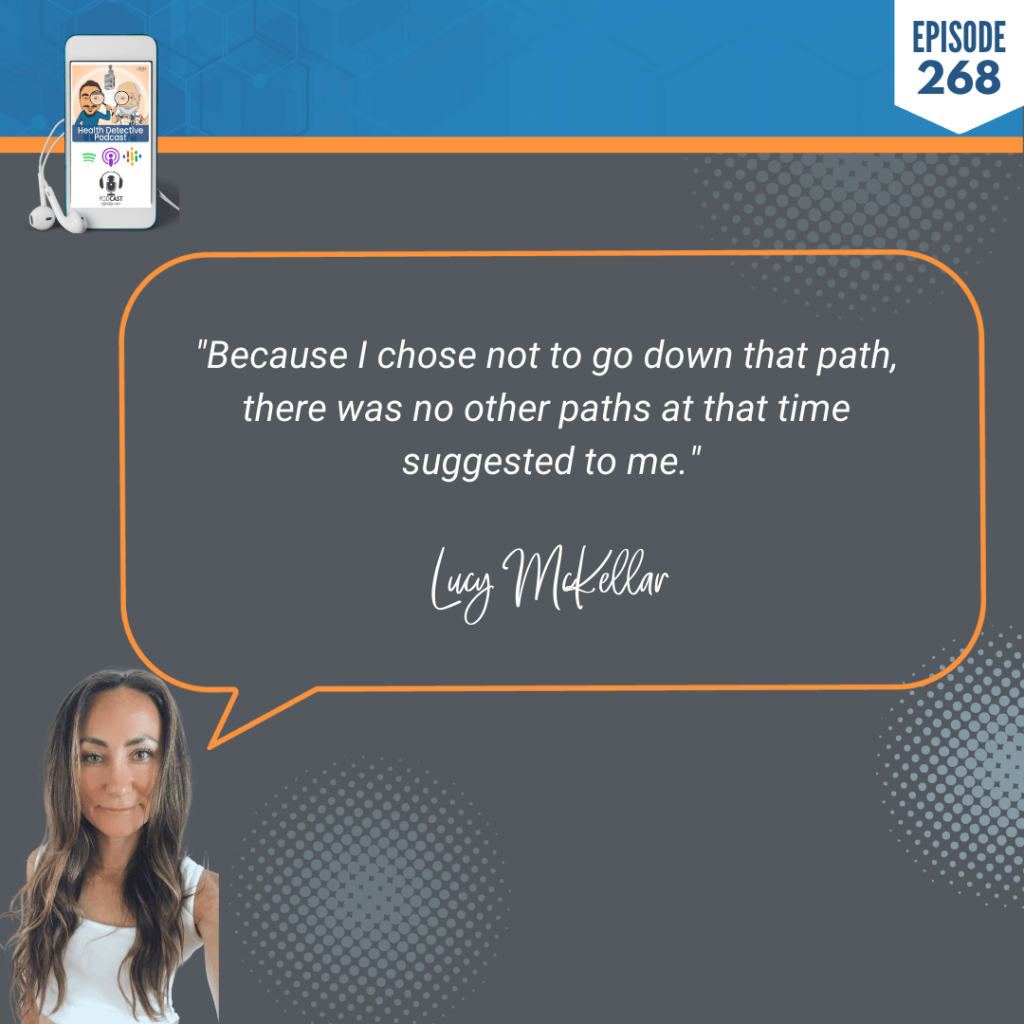
But because I chose not to go down that path, there was no other paths at that time suggested to me. So, they basically were like, okay, on you go. That’s why my journey was such a long one because I was just in anxiety purgatory being like, okay, I am terrified. There’s nothing wrong with me, but I’m terrified all the time, and I don’t know what to do.
[00:12:46] Detective Ev: Well, yeah. So, going back into your journey and kind of diving into the next steps here. This happens in your twenties; you have no idea what the heck this is. You just know something is majorly wrong. It sounds like relatively shortly after is when you got this prescription.
Mental Wellness: Some Relief
So, did you get that diagnosis? Panic attacks are pretty distinct. Usually that one’s not going to be missed. Did someone end up saying, okay, this is a panic attack? Were you able to get help for this afterwards? Or what would the next steps look like?
[00:13:11] Lucy McKellar: For several months, I kind of floundered around. The doctor that I had that had given me the prescription, nothing more from them. They couldn’t do anything to help me.
And at the time, someone I was close to, I think they might have done a bit of research. I mean, we’re going back like, you know, pre-Instagram days, so it’s not like I could just jump on and search “fear” or whatever I was feeling. So, I think he probably went on Google or whatever and told me he found a therapist for me. She was like a combination of CBT and hypnotherapy.

I went and met her. She was the one that told me what had happened to me, what I was dealing with. And I did some therapy and some sessions with her. Over time, but I’m talking like four years, the panic attacks got better and eventually subsided. So, I guess for the first portion of it, I dealt with it using therapy, but it wasn’t enough. I was still always anxious even when I wasn’t having daily panic attacks anymore, always in fight or flight. Like, I still woke up on edge.
[00:14:26] Detective Ev: Lucy will give me grace for this because she knows how crazy everyone’s schedule is right now. For some reason, I was connecting the story with the doctor and the SSRI to the panic attack thing. I’m like, wait, no, that was from the post viral thing.
Mental Wellness: A Panic Attack Portrait
[00:14:39] Lucy McKellar: Well, no, it was. So, I went to the doctor literally, maybe like, three days after the first panic attack, scared and I didn’t know what was happening. He also wrote me a prescription to go to sleep.
[00:14:51] Detective Ev: Alright, so that makes a lot more sense. But he just did it for the sleep thing. He wasn’t diagnosing anything. Wow. Okay.
[00:14:57] Lucy McKellar: I found out from the therapist.
[00:14:59] Detective Ev: Got it. Alright. That’s even scarier. I mean, now you get this medication, kind of, again, same category, right? But you still don’t know really why the heck you’re taking this. And panic attacks, it’s so tough to describe it. I know we tried to emphasize this even in the last show, which wasn’t really about that. But still, I always feel the need to do it because it’s something we’ve dealt with.
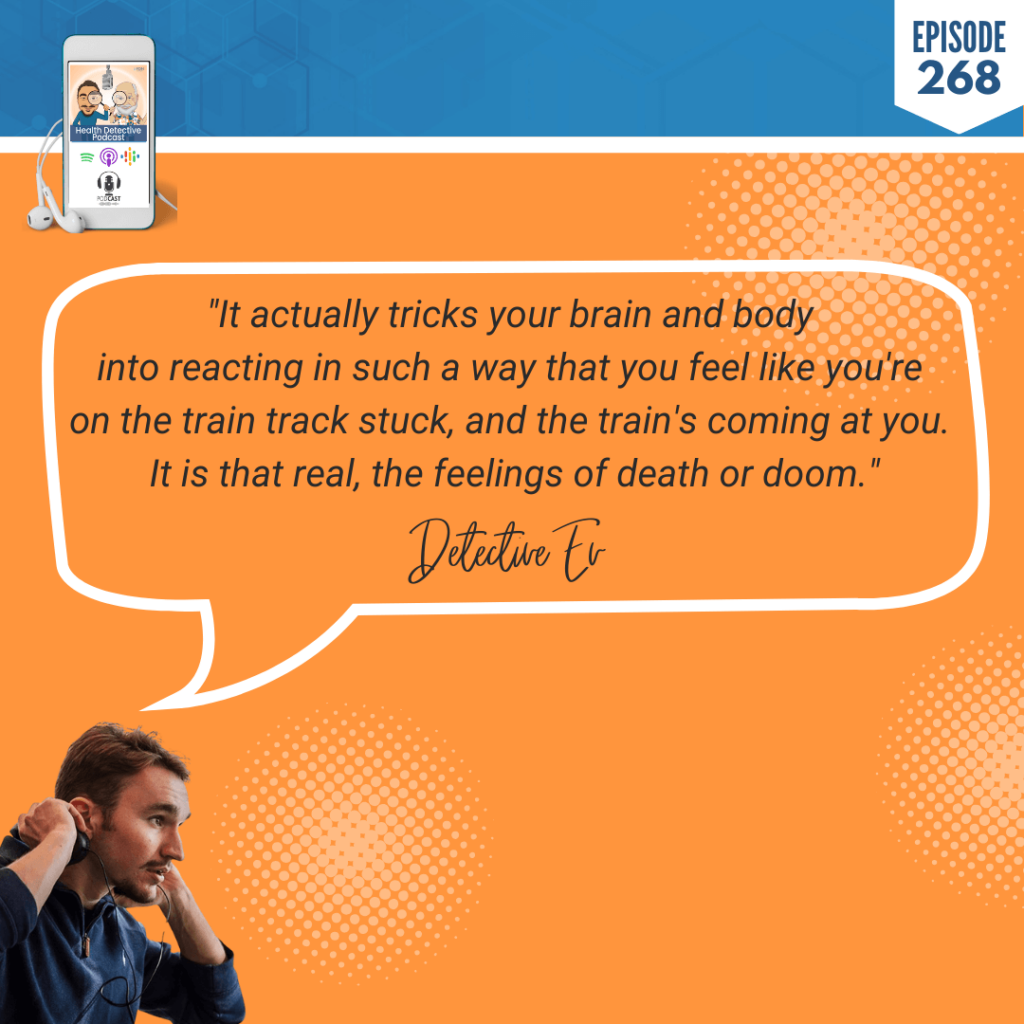
When people say you feel like you’re dying, they mean that literally. It actually tricks your brain and body into reacting in such a way that you feel like you’re on the train track stuck, and the train’s coming at you. It is that real, the feelings of death or doom. And if you look at the symptoms, it says it right there. It’s like fear of impending doom. That’s literally how one experiences it.
So, man, it’s already scary enough, but to not even get a name put onto it for a while, basically, until this therapist comes in and says, what’s going on, that’s tough. And then, it sounds like you were dealing with what might’ve been called a generalized anxiety disorder too. But did that get diagnosed or is this just something that you’re walking around with the feelings of?
Mental Wellness: Mental Health Stigma
[00:15:57] Lucy McKellar: No, it was just the feelings. The therapist told me what I was experiencing. She said, you’re experiencing panic and anxiety. But it’s actually only years and years later that I was told by a doctor, retrospectively, oh yeah, you had panic disorder and GAD. I was like, oh.
[00:16:18] Detective Ev: Wow. It makes sense too, I guess, if this is pre-Instagram days; things have changed.
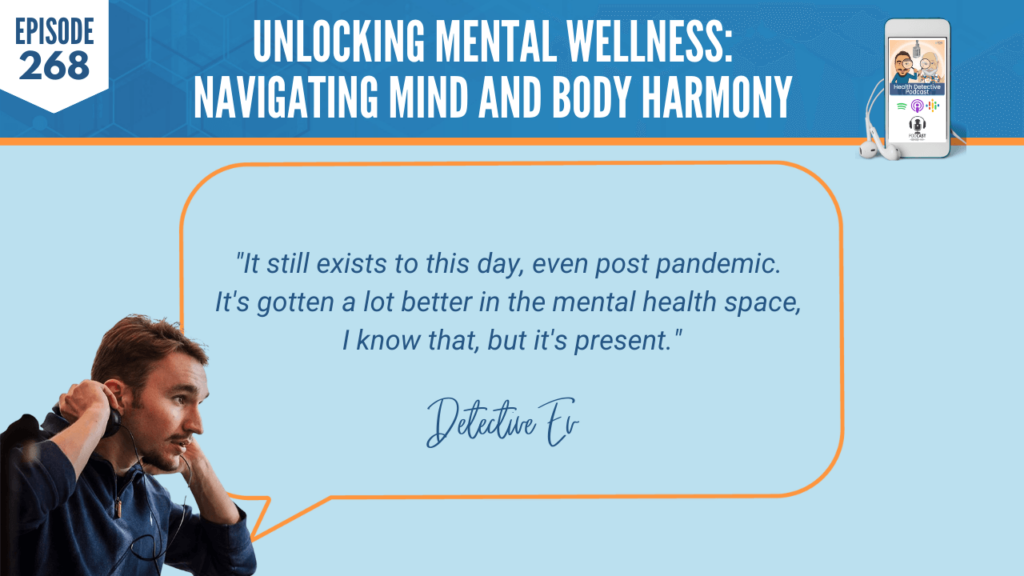
I had a similar experience, but I was so young that I thought that was why, and I thought they didn’t really recognize it just being a kid. But I guess this was more of a widespread thing where just like we all, unfortunately, kind of deal with the stigma around mental health. It still exists to this day, even post pandemic. It’s gotten a lot better in the mental health space, I know that, but it’s present.
I think that affects health professionals too; I think doctors have their own stigmas. It’s not that they’re judging us for it; it’s not that type of stigma. But it’s an expectation of, is this person coming in with this if they don’t see it every single day. Which I guarantee, right now, they’re seeing panic attacks every day in the office, guarantee they’re seeing depression every day in the office. Well, you almost expect it. It’s not abnormal.
Lucy comes in with this. Yeah, that’s a panic attack. That’s a panic disorder. This is what you do. But I don’t know what it was back then. Maybe one out of 10 people were coming in with this, maybe it was one out of 50. I don’t have any idea.
When did you start getting into then this more natural side of things? Because you’re on this completely different journey beforehand.
Mental Wellness: A Desire to Help Others
You’re a healthy person, not necessarily interested in this stuff, not disinterested, but it’s not your life. You have these experiences. You’re going through more of a traditional treatment route. Therapy is something that Eastern and Western can agree on, but it’s still different than functional medicine. So, when did you start approaching from the natural side?
[00:17:37] Lucy McKellar: It kind of happened by accident, actually, when I was about 30. So, five or six years into my journey, I began a journey of health, but not for mental health reasons.
I just got to a point where I was drinking a lot and I was like, I don’t want to live like this anymore. This is not really my thing. So, I started looking into taking care of myself more. I started regularly exercising. I actually cut out gluten. At the time, that was like the thing to do. So, I was like, I’m going to give up gluten.
But unbeknownst to me, all these things started to happen, and I started to experience less and less anxiety. I didn’t notice it at the time because I still had anxiety, so that was really all I cared about. But looking back now, I can see the slow progression and I got more and more interested in it.

It then took a few years and I basically decided that I wanted to help. Because I’d gotten into a place where I felt a lot better, I actually started doing mindset coaching for people dealing with mental health issues, and I kind of just fell down this rabbit hole of healing.
Mental Wellness: The Path to FDN
One thing led to another, and I read a book called Woman Code by Alisa Vitti, I think. In the back of it, there was a four-day diet plan. The idea was actually not to help with anxiety, it was to help with hormone balance and things like that. But I did the four-day diet, and I had no anxiety. I was like, what? This hasn’t happened to me in a decade. There’s got to be something to this.
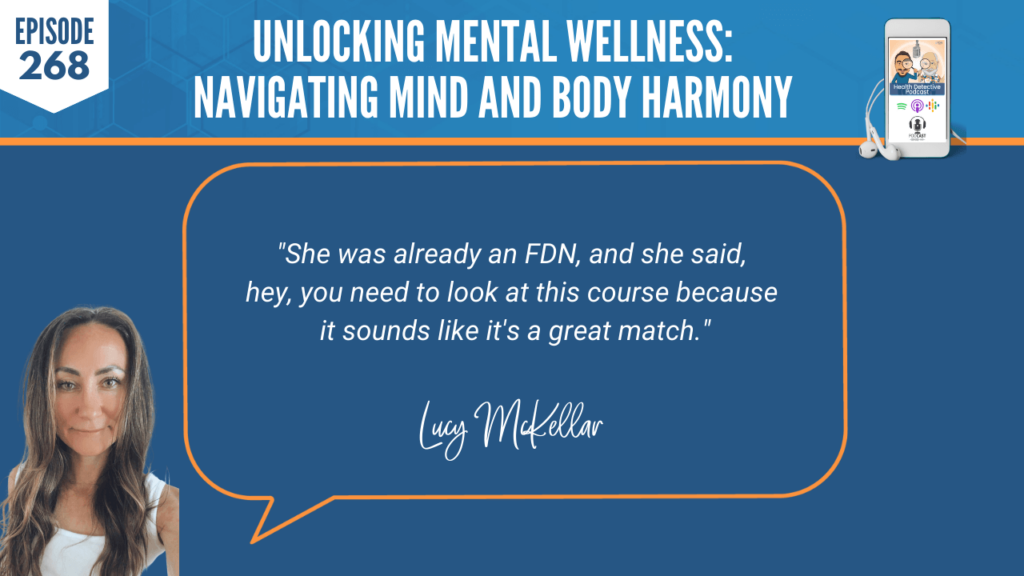
From there I just fell into this gut health rabbit hole. I started posting about what I was finding and one of my friends actually messaged me. She was already an FDN, and she said, hey, you need to look at this course because it sounds like it’s a great match. And I was looking to learn more about gut health specifically at the time. Then, yeah, I found FDN, signed up, and the rest is history.
[00:19:45] Detective Ev: It’s always fascinating to me how everyone’s health journey is unique, like the experiences are unique. But I could almost write a textbook exactly how this is going to play out in terms of people ending up in these things as career paths.
We’re kind of going along, we have these random health symptoms. So, we’re like, what the heck? We follow the conventional route first because why wouldn’t you? That just makes sense; that’s the intuitive way to do this initially. It’s like, alright, I’ll go to the doctor, figure out what’s up. It doesn’t necessarily work the way we wanted it to, and we start experiencing some other stuff.
Mental Wellness: The Choice
There’s a few, maybe lucky moments in all of it, right? You get the right book; you have a friend in the right course. It’s cool how these things happen. And then all of a sudden, you’re the dang director of the Association of FDN Professionals. It’s amazing how this kind of comes full circle.
So, was FDN the first course that you went through at that point?
[00:20:33] Lucy McKellar: No, it actually wasn’t. I did a random gut health course. I’m sure you’ve seen them. I just bought it from some random coach.
[00:20:41] Detective Ev: Shorter though?
Lucy McKellar: Yeah.
Detective Ev: I know. You get the Facebook ad and you’re like, dang. I’m looking to spend $500 today, baby. I need some credit card points.
[00:20:49] Lucy McKellar: Yeah. It was called something really random. I couldn’t even tell you the coach it was from. It was just like a start on my path. But it definitely made me realize I was thirsty for science, not just someone being like, do this, do that.

And I think I started looking into IIN, as well. I was deciding between IIN and FDN and went down the FDN path.
[00:21:12] Detective Ev: Yeah. It’s always worth mentioning because I actually did go through IIN first. For those listening, there’s always going to be someone listening that’s on the fence about both. And I know this because like 25%, 30% of the people that call us are postgraduates at IIN and they want to move into FDN.
Mental Wellness: Curiosity
It’s not one or the other is bad or good; it has nothing to do with that. IIN is a traditional health coaching program. So, if you visualize your dream career as sitting down with someone, kind of diving deep into the psychology and just going back and forth in that way, goal setting, stuff like that, all important, that would be the program.
If you are someone that wants to dive deep into the science, the lab testing, and really be able to help quite sick people, that would be the FDN route. And you can mix both together too, nothing wrong with that.
We do have some comments that came through, so I will just shout some of these out.
We had some people saying, “love it.” “That’s crazy”, just the journey and stuff. Tracy said, “what a horrible never-ending cycle of fear. You feel so trapped in life when experiencing these types of things.” Absolutely. Oh, and Ryu joined us again. Good morning to you, my friend. That’s awesome that you got back.
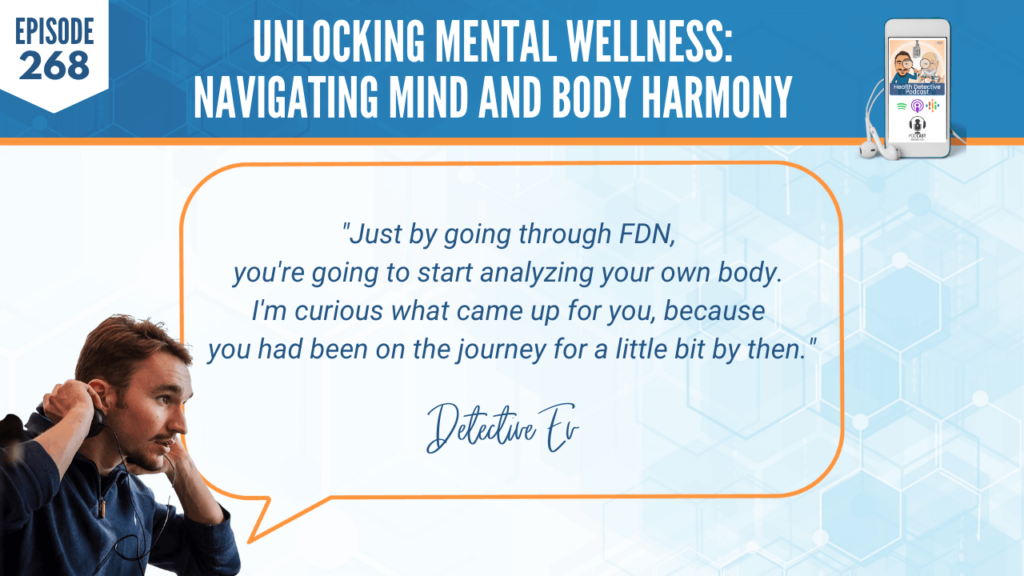
So, when you did your self-study, your gut course, and especially FDN, I’m curious what ended up being some findings of yours. Like what did you end up realizing was going on in your body? Because for those that don’t know, the FDN course includes lab tests in the cost of tuition. So, just by going through FDN, you’re going to start analyzing your own body. I’m curious what came up for you, because you had been on the journey for a little bit by then.
Mental Wellness: Lots of Healing Opportunities
[00:22:35] Lucy McKellar: So, everything. I had H. pylori. My gut was just a total mess. I had candida, a crap ton of dysbiosis. My good gut bacteria was like non-existent. Everything was low. I think there were like three that were normal out of like the eight or so that we look at. Like I had really low gut acidity. My B glucuronidase was super high. Everything was just completely messed up. My hormones were all over the place.

It just made so much sense. Actually, it made me feel so much better. I think a lot of people get really freak out when they see a sheet with red all over it, but it helped me understand that what I was dealing with wasn’t my fault. It was my fault in the way that I had led a life that had created it. But the feelings, what I was feeling were not my fault. Does that make sense?
[00:23:33] Detective Ev: Well, yeah. And tell me if you agree with this and if you don’t, that’s okay.
I would even go as far as to say, maybe none of it’s your fault, but it is your responsibility and your ability to get out of it. That’s probably maybe the middle of it.
Lucy McKellar: Yeah, a hundred percent.
Detective Ev: Cool. So, you find a lot of stuff. I totally get that because I think only the people who have had chronic symptoms truly understand this, not necessarily mental health, but physical health. We’re like the people, yeah, you get some bad labs back. You’re like, yeah! And your family’s looking like you’re crazy. Why do you like this? It’s not that I like it, it’s that I’m validated.
Mental Wellness: Fault Vs. Responsibility
Because you guys have to think, maybe you haven’t been through this stuff and you’re just listening because you’re interested in the topic. That’s wonderful.
If you’re someone like Lucy, who, you have these symptoms, they’re scary as heck. You go to the doctors, they’re not really ever able to tell you fully until years down the road what was going on, and then you’re still experiencing this stuff. When someone like that gets the lab results back and you see all these things that are bad, you don’t get scared. You already knew something was wrong, that’s not news to you. Everyone else just didn’t know. Right?
The reason that the labs can be so profound is because it’s like, oh, dang, I have something I can work on too. And that’s where that personal responsibility side comes in.
When I say it’s not your fault, what I meant was, obviously, you did not choose that. I’m not judging the people that this has happened to, my dad smokes. But like if I smoke two packs of cigarettes a day and I get lung cancer, that would be a little more in the fault side in my opinion, because that’s not news to anyone that smokes cigarettes. You know that was a risk factor.
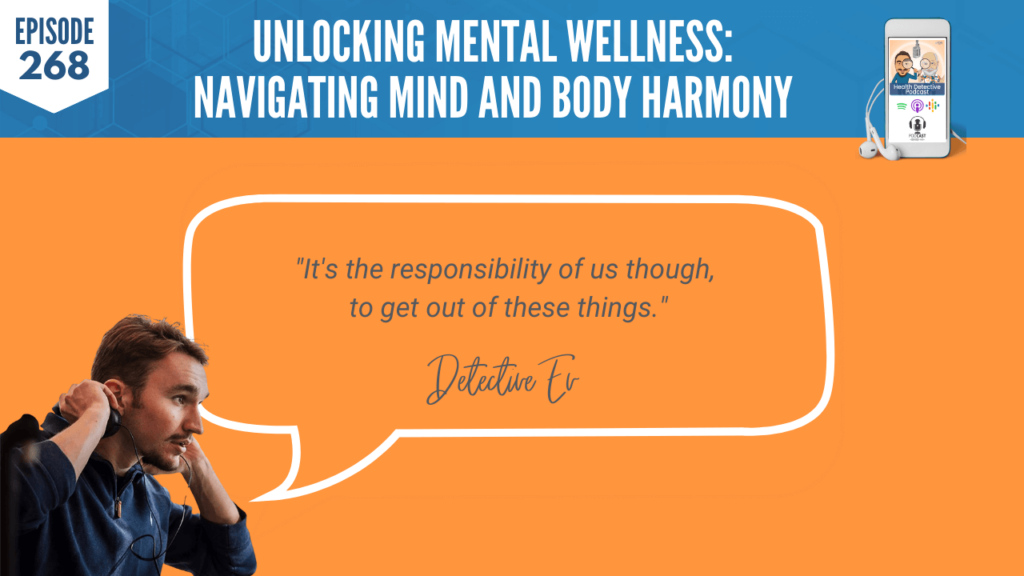
I don’t think that you knew the things that you were doing, considering, I mean, you said yourself, you didn’t really even know about mental health. I don’t think you ever knew panic attacks were a risk to what was going on. It’s the responsibility of us though, to get out of these things.
Mental Wellness: No Triggers
I don’t agree with what I’m about to say, by the way, but I heard some doctor say it at some point, and I thought it was very interesting that you brought up the candida thing. There was some doctor that actually believed that all – A L L – a hundred percent cases of panic disorder were caused by candida overgrowth.
Now I don’t agree with that; I think it’s oversimplified. But my point is the fact that they could even be a doctor that stood so strongly in that opinion because they’ve seen that correlated so many times, I think that’s fascinating. And their logic was, candida, it releases these toxins as it’s being kind of broken down, that it causes symptoms in the body that lead to panic attacks.
So, a little off track here, but I gotta ask. Were the panic attacks, I know the one in sleep had to be random, but were the ones after that truly random? Or did you feel like you had a physical symptom first that then led to a cascade of other stuff going on with the panic side of things? Or was it just, hey, I’m good one second, and the next second, I’m out here?

[00:26:05] Lucy McKellar: Well, when I was really going through it, I was always anxious, but I didn’t have a specific trigger. You know how some people, they get claustrophobic. I was living in London at the time and a lot of people would get anxiety going on the tube because it is underground and closed in. So, that was like a trigger. I had nothing like that.
Mental Wellness: Candida & Acetaldehyde
One time I thought I was better, I thought I’d escaped. I hadn’t had a panic attack for like six months. So, I was like, this is amazing; was living my best life.
Then I was having lunch with my cousin in the middle of London. It was a beautiful sunny day. I’ll never forget it. I felt so relaxed and then all of a sudden, bam, panic attack out of absolutely freaking nowhere. Of course, the cycle kind of started all over again.
It was really frustrating to me because everybody that I spoke to, every professional that I spoke to, would always say to me, what’s your trigger? Do you have a trigger? I deeply believe this; I wasted years looking for an external trigger. I didn’t have one because all my stuff was internal. My body was in chaos. It just was a nightmare.
[00:27:11] Detective Ev: That’s why we do the podcast. Right? I like hearing these different stories and it’s one of the many reasons I don’t fully agree with that doctor.
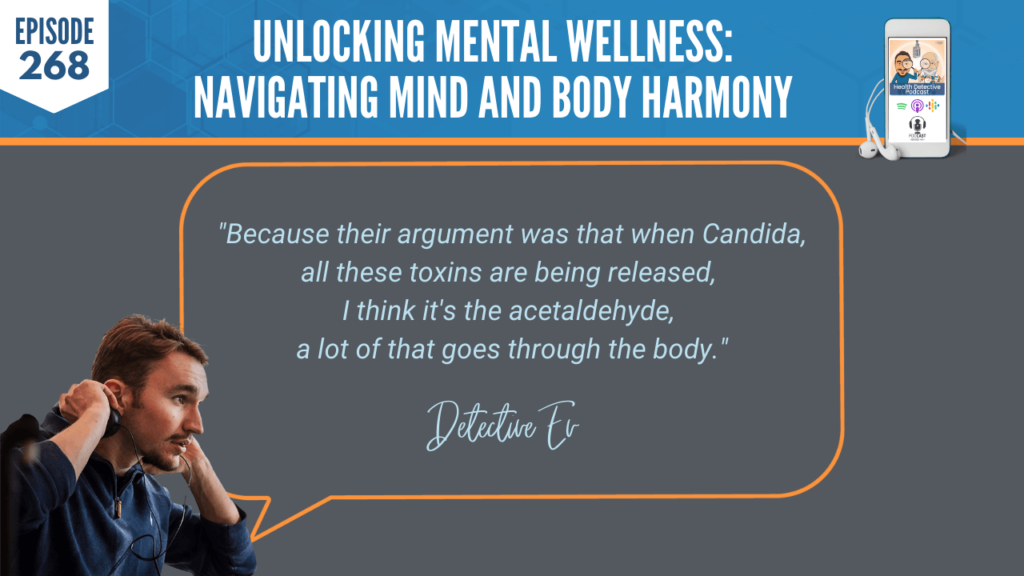
I just knew I was biased with it, but I found that it resonated with me to some degree. Because their argument was that when Candida, all these toxins are being released, I think it’s the acetaldehyde, a lot of that goes through the body. It can create symptoms like chest pain or feeling like you can’t breathe, or you get stuff on your skin or whatever.
And I remember looking back. Ninety-nine percent of the time for me, there was one or two symptoms that would precede the panic attack. I felt like I couldn’t breathe for a second. Now, of course, that’s also a symptom of a panic attack, so it’s kind of a chicken or egg thing.
Mental Wellness: The Anxiety Club
But it almost seemed like there was this moment where I go from, alright, I’m uncomfortable with this symptom to whoop, we just jumped into this. And obviously anyone who feels like they can’t breathe would become pretty dang nervous very quickly. So, I was just wondering, always curious about the different ways that people experience this.

And I think sharing both of those is actually useful to people who will listen to this. Because the panic attack thing is impossible to describe to someone else unless you’ve been through it, I think. And that’s like many health conditions. So, for the people listening, I hope they’re like, it’s not the club you wanted to be in, I suppose, but they’re like, all right, dang, these people are in my club too. I get this.
So yeah, yours were truly random. You’re having fun with someone you like and bam, it hits you out of nowhere.
Nice. Ryu, has some great comments. I gotta throw this up here. “Butyrate helps our mood and crosses the blood brain barrier.” Absolutely. Very nice. Thank you.
Ryu, I gotta ask, do you have any certifications or what do you do? You came in last time too with a bunch of different knowledge. Are you just a self-studier? I’d love to learn more about you and what you’re doing.
With that said though, so you go through the FDN course, you find that all this crazy stuff’s going on. How did the journey look after that? When did you graduate FDN by the way? I don’t know that offhand.
[00:28:53] Lucy McKellar: January 2020.
[00:28:56] Detective Ev: Okay. So, you’ve been in for a few years. You’ve had some time to implement the protocols and make some changes.
Mental Wellness: Freedom
What have the last few years looked like? Because it’s not like you weren’t up against a lot. The world kind of took a poop and it seems to never end. It just keeps on going right now. So, if anything, this would be a time where it should be harder to feel better. And it looks like you’re probably doing pretty dang good based on what I’ve heard from you. So, yeah. What does the last three years look like in terms of the protocol and changing things?
[00:29:23] Lucy McKellar: It’s freedom. It’s been relief, it’s allowed me to have my life back. I mean, especially at the beginning, I felt like I wasn’t living my life; I was literally existing. So, I remember watching people pausing on the street, having a nice little chat, and thinking, how are you living your life so easily when I can barely function? And it just seemed very, very unfair.
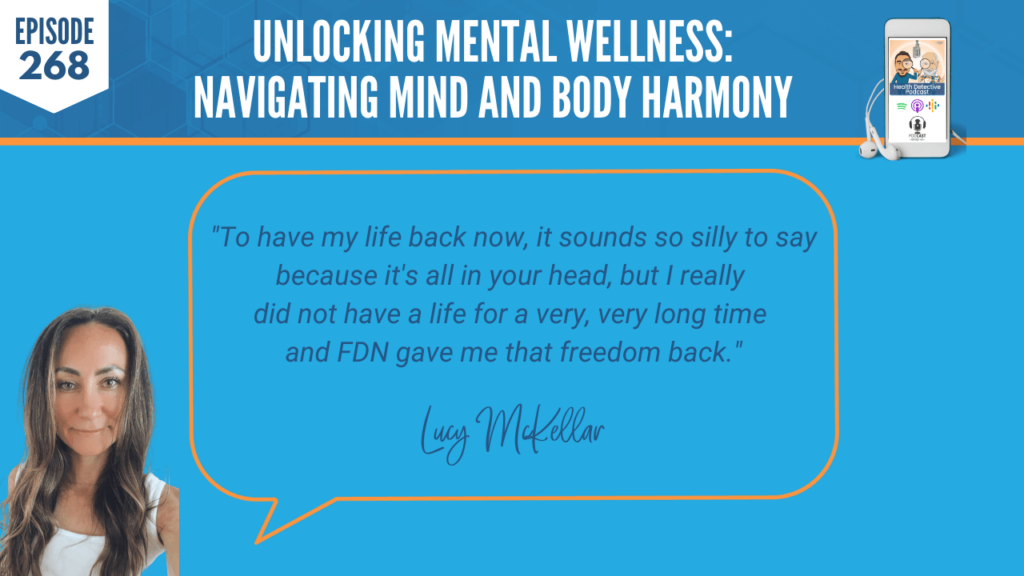
To have my life back now, it sounds so silly to say because it’s all in your head, but I really did not have a life for a very, very long time and FDN gave me that freedom back. I just couldn’t get away from the anxiety. I was fortunate that I managed to get a hold of the panic attacks through therapy, but the anxiety was just always there, and it stops you doing a lot of stuff even without the panic attacks.
[00:30:12] Detective Ev: I get that. Well, you know, maybe to someone out there, but to me it definitely doesn’t sound cheesy. When you are dealing with these things, any mental health condition, depression, whatever, it’s all consuming.
Mental Wellness: A Healthy Level of Gratitude
You can have the best stuff around you too, living in a nice place, have nice things. It’s just weird; it just takes over. And that’s the main focus in life.
The good part about this, what’s really cool, because your answer, when you said freedom that was so interesting. It was just so genuine. That was an interesting way to answer that. I’m like, okay, that’s a person who’s been through this for real. Right? You can’t fake the way that you answered it, in my opinion.
When you’ve been through this though, this is the good side of it, man, your perspective on just daily life that, I think too, many people take for granted, is so different. Like, I’ll be going through my normal life and I’m just happy, you know. And it’s not a perfect life, right? You have bad days; I’m not saying that. But I am so easily able to be thankful and happy on otherwise normal days.
Because if I’m not feeling grateful, I’m like, dude, thank God I’m not worried about when’s this next panic attack going to happen. You know, I’m not having some suicidal ideation. Just enjoy the beautiful day, like that’s what it is. It’s a very genuine gratitude. And it’s a good way to live the rest of your life, in my opinion.

So, I don’t know that I would want to do it over again, certainly not for the length of time that I did it. But I wouldn’t mind a bit of it to get this level of gratitude now. Because I don’t know if I would’ve had the level of gratitude that I have if I hadn’t experience both sides of it. And it sounds like that’s probably the same for you too.
Mental Wellness: The FDN Solution
[00:31:32] Lucy McKellar: Yeah. I mean, I was a bit of an idiot when I was in my early twenties anyway, so I don’t know. I think it’s definitely given me more purpose. I’m very passionate about mental health and about helping other people understand that there are other answers out there for you, rather than just take this pill. Cause to me it’s not a solution.
I don’t want to upset anyone. There’s nothing wrong with taking medication. You do what you need to do. But it’s not, to me, a long-term solution. Like, it’s not going to solve the issue. And I wanted to solve the issue because I was so sick of feeling it.
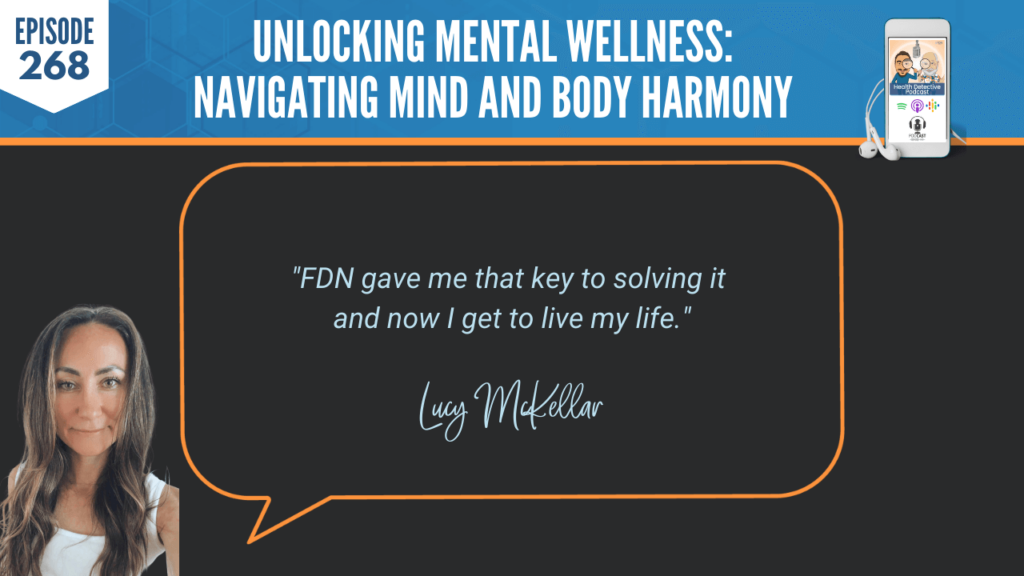
FDN gave me that key to solving it and now I get to live my life. You don’t forget. It does get easier obviously, but you don’t forget how terrifying and lonely the experience is. And it does give you that perspective.
[00:32:31] Detective Ev: And focusing on those solutions is kind of perfect timing.
By the way, Ryu said they self-study and are interested in starting FDN potentially this winter. That’s awesome. We’d love to have someone like you. Thank you for just contributing your knowledge to this podcast. We’d love having you.
Tracy said, and we’ll kind of use this to start the next part here, “how do we explain to people outside of the health space that mental health can absolutely start in the gut?” Her experience is that they don’t get it. An even bigger question there, in addition to that is just, what are some of these things that you think people need to nail down?
Mental Wellness: A Full Body Experience
I think most people that would listen to or watch something like this understand that medication is a temporary thing. I think they understand that FDN’s not against medication at all, but no one woke up and was deficient in Zoloft. No one woke up and was deficient in Xanax. That is a factual statement.
You can use those things to get some help. Because man, the stress that comes from dealing with these things and not getting relief is way worse probably than taking a dang medication. But it’s like, can we go a step further and try to get you to the point where you don’t have the stress and you don’t also need the medication? That would be a wonderful thing.
So, from what you’ve learned over your time of studying and going through FDN and stuff, what are some big things that people need to nail down?
[00:33:39] Lucy McKellar: Ooh, where do we start? So, blood sugar is a huge one, especially in the morning. I think we live in a very fast paced society. And I think a lot of people don’t take the time to look at how their body is functioning on a day-to-day basis and actually understand that this is having an impact. Our bodies are connected.

And I’m very, very passionate about helping people understand that mental health is health. It’s not just up here; it is a full body experience. Because when your body is struggling, it is struggling. So, things go sideways, and it doesn’t function as it should. And anxiety, to me, in my opinion, is your body’s cry for help. It’s like struggling that bad.
Mental Wellness: The Impact on the Body
The reason I would suggest starting in the gut and looking in your gut, there’s a few, but hormones, there’s a lot of hormones that are synthesized in your gut, like your happy hormones, serotonin, melatonin for sleep.
Then on top of that, they help with digestion. And if you don’t have those hormones to create all these things, your body can’t function properly. Things start sliding and it begins to kind of trickle and then it gets bigger and bigger until you finally end up with a million panic attacks like I did.
See, I deeply believe that all my stuff started because I wasn’t taking care of myself. I was 24 and I was going out on weekends. You know, I considered myself healthy because I’m skinny. So, I was like, I eat homecooked meals four times a week; I’m healthy. But in the meantime, I was binge drinking, doing drugs at weekends, partying my butt off, not getting any sleep. And all of that has a direct impact on your body. We’re using up our vital reserve.
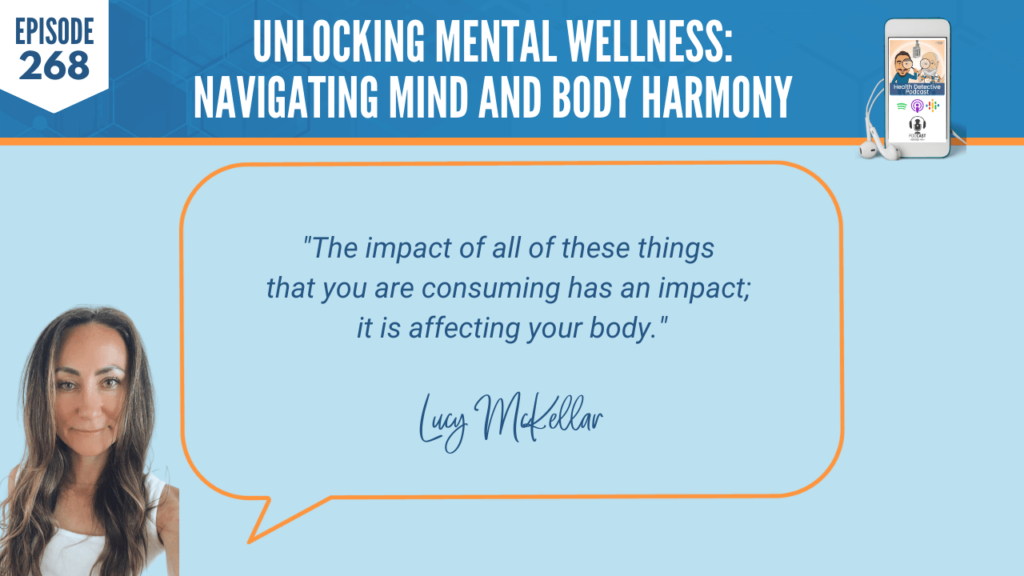
But because you’re in your early 20’s, at least for me, I was like, it’s fine. I don’t care. Like I’ll sleep when I’m dead. That’s what all my friends used to say, and I said as well. But the impact of all of these things that you are consuming has an impact; it is affecting your body.
Obviously, a lot of things go through our gut and that’s where we have to digest things. So, our gut and our liver are extremely important when starting a health journey. And I mentioned blood sugar before, but blood sugar spikes when you are dealing with anxiety, puts your hormones into overdrive.
Mental Wellness: The Food Connection
If your hormones are already crazy from being so anxious all the time, you’re already in fight or flight, your body is already overproducing cortisol, it’s going to get even worse.
Really, you can start just by looking at blood sugar, balancing your hormones in the morning, doing simple things like eating within one hour of waking up, making sure you’re eating a balanced breakfast. Skip the fast food, the cereal bars, things like that, anything that’s like high in sugar and carbohydrates, I tried to avoid when I was dealing with this.
[00:36:44] Detective Ev: Okay. And I’m not recommending people go do the four-day diet. But I am fascinated looking back to that, that you did this four-day thing based on a book recommendation. And it did work, at least to some degree, for the anxiety and stuff.
Instead of giving too many specifics on the exact day by day diet, what do you think was included or not included in that that worked? Was it a gluten-free thing? Or was it, eat one hour after waking up? What was included in that that led to such quick results?
[00:37:12] Lucy McKellar: To be honest with you, I couldn’t even tell you what the exact meals were in the book. But it was whole foods approach, and it was three meals a day. It said you need to eat, I think they said, within two hours. I’ve just personally found that an hour is better for my blood sugar.

And it was things that I hadn’t really considered eating like a lot of fish. Saying that out loud now sounds really silly, but at the time, I just didn’t think about what I was eating, if that makes sense. I didn’t have that connection yet.
Mental Wellness: Sudden Stress
The focus is very much on nutrient dense food. They were talking about omega 3’s for hormones and getting fish and a lot of beans and things, lentils. It’s a great book, go check it out. But it just kind of opened the conversation for me that this was potentially a path to go down and examine.
[00:38:09] Detective Ev: Then just to be clear, what was your career before? I think I remember this, but what was your career before kind of working like in FDN? Obviously, you love this company and the things that we’ve done. You now are literally in a huge position here, which is amazing. So, what were you doing before this if you never got anxiety and panic attacks?
[00:38:30] Lucy McKellar: I was in digital marketing.
Detective Ev: That aligns.
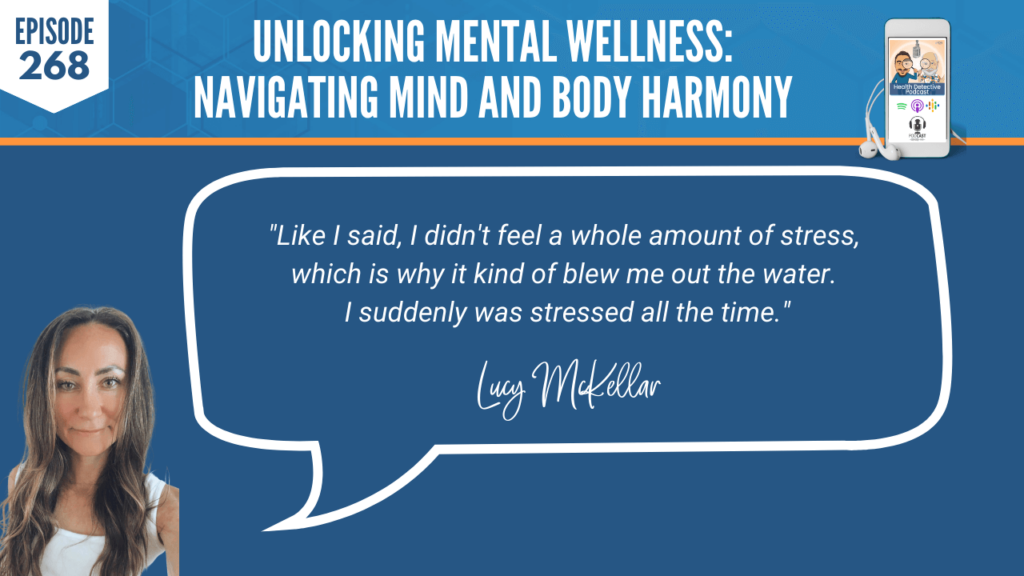
Lucy McKellar: Actually, the time I started having panic attacks, I was in sales, so, high stress. But like I said, I didn’t feel a whole amount of stress, which is why it kind of blew me out the water. I suddenly was stressed all the time.
But yeah, I was in sales and then transitioned to digital marketing throughout the years.
[00:38:53] Detective Ev: Looking back now, you did the therapy thing, the medication thing, obviously a lot of natural stuff, we’re not against any of those things. But I’m curious about the order and the urgency that would’ve been taken if you knew then what you knew now.
In other words, if someone’s listening right now and is still actively dealing with panic attacks, what steps do you do tomorrow if you’re that person that’s struggling right now, clicked on this because they saw the title, and are like, holy crap, I need this to go away ASAP?
Mental Wellness: Steps to Freedom
[00:39:21] Lucy McKellar: That’s a really great question. I do feel fortunate that I’m in the position that I am in FDN. But the first thing I would do if I had a panic attack tomorrow, I would immediately run all of the labs that I have available within reason, like our foundational labs, on myself and work from there.
I would look at my diet, at my sleep schedule, at the last three months in terms of stress load and how I’m managing it and course correct. Maybe I’m not dealing with stress in as healthy a way as I need to. So, maybe I’d start looking at meditation, exercise.
One thing I would also do, which I know a lot of people think is counterintuitive, I might pull back on my exercise. A lot of people use exercise to help with anxiety and it absolutely does. But I think sometimes some of us have a tendency to go really hard on exercise when we are anxious as an escape.
And actually, that can kind of be backwards because anxiety is a stressor on our body. It’s a good stressor, but it’s still going to add stress hormones to the mix. So, I would probably look at reigning it back to like yoga, Pilates, even walking. When I went through my healing process, I just walked every day. That was the only form of exercise that I did.

Obviously, everyone is different. You need to check in with yourself about how you’re feeling after exercise, but I really would just kind of hold myself accountable. Take a step back, look at how I’d been behaving, and then look at what I can do to move forward in a more cohesive way, I guess.
Mental Wellness: Introspection
[00:41:07] Detective Ev: Well, and that’s actually kind of a common theme of your podcast today because you brought this up in different ways, a few times. You talked about, I wasn’t thinking about what I was eating, you know, I thought I could just kind of do this forever.
And then even this, you gave steps, but you also recommended introspection, more or less, like what’s going on. And I think that’s how a lot of us operate on a daily basis with many different habits that we have. This goes totally outside of health. It could be with finances; it can be with relationships. And we expect teenagers to do it, but we do carry this into our twenties, thirties, and beyond.
Some people will do this for the rest of their life. You know, you ask someone, well, what were you thinking when they made like a bad decision or whatever? I wasn’t. You know, and you realize you weren’t. And I remember thinking that all the time.
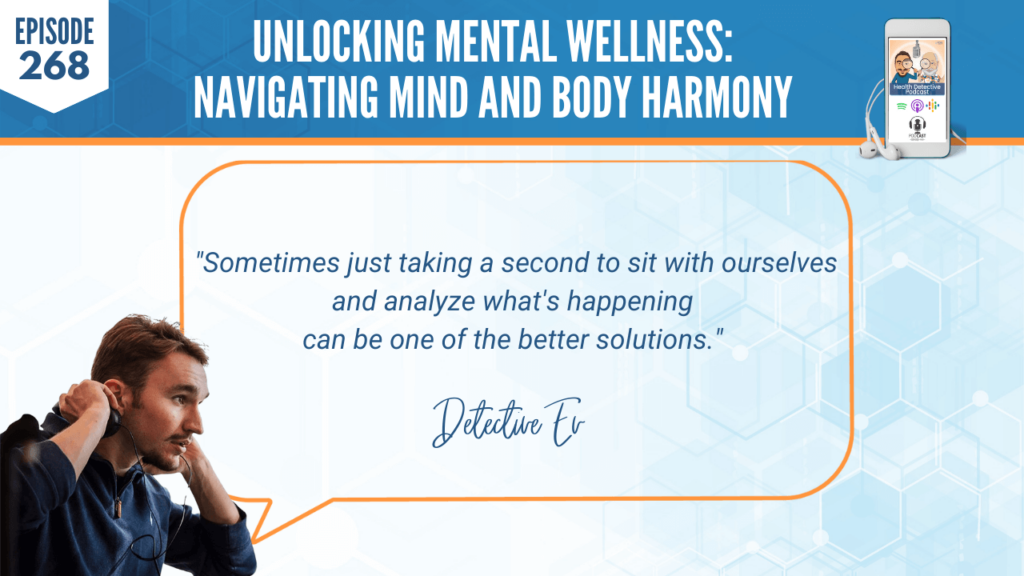
I never understood that question. I’d always get in trouble as a teenager and my parents were like, what the heck are you thinking? I’m like, I wasn’t. Like, I was just trying to have fun. If I was thinking I wouldn’t have probably done it. We can laugh about that now, but we really do. Sometimes just taking a second to sit with ourselves and analyze what’s happening can be one of the better solutions.
What happens in today’s world is who the heck gets a second to actually think? Because you’re either going to work all day or you’re traveling to work and then you get home and you’re completely stimulated on these things or whatever.
Mental Wellness: Necessary Processing
It’s amazing what a simple 10-minute break, whether it’s through walking or whatever, without music, without the audiobook, without whatever, can do. Like, those thoughts are going to come up. And if you’re so uncomfortable with the thoughts that come up that you can’t even do that, I think that’s not something to fear. That’s actually a room for healing in and of itself. Many people will not want to do that because of those thoughts. I don’t know if I’d keep repressing that even farther. Right?

[00:42:38] Lucy McKellar: I completely agree. I think we definitely need to be comfortable with being alone, with alone time, like with processing. Because if you’re not processing it, it’s going to go somewhere. And if you don’t deal with it, you’re going to have to at some point is basically what I’m trying to say. So, you may as well do it bit by bit. I think that that’s a much healthier approach to it.
[00:42:59] Detective Ev: Yeah, it’s just like the symptoms, right? You can ignore maybe minor symptoms for a while, but eventually it’s just going to keep building and building. So, the best answer is always just address it where it’s at. Do what you can. And then you start learning to tune in with your body a lot better.
Some of this stuff is tricky. The exercise one is still, it’s almost like I can’t believe it, and that’s my problem. I’m not good at translating in my head that, all right, I worked for 10 hours so that is a stress on the body. Because I’m not like landscaping, I’m doing podcasts, I’m doing sales calls, whatever. Like I don’t translate that the same as a physical labor job.
Mental Wellness: Overwhelming & Constant Stress
This just happened the other night. I came home and told Maddy. I was so dizzy after Jujutsu. And she’s like, dude, you did weightlift this morning, you worked 10 hours, and then you went and did Jujutsu. I’m like trying to think of, oh, is it this reason? Is it a sinus thing? Is it water? Maybe it’s just too much. Like, could that be it?
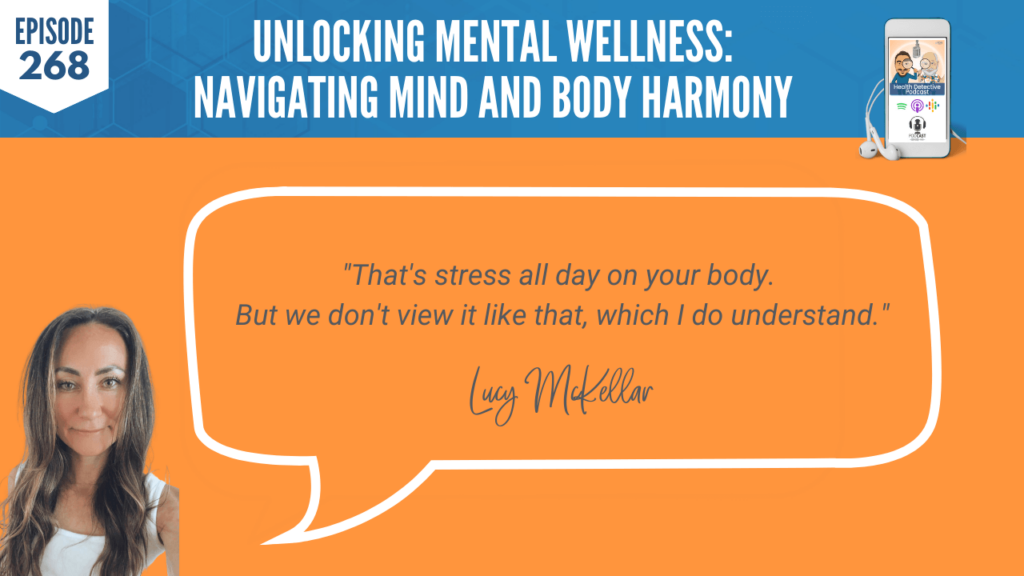
[00:43:48] Lucy McKellar: Yeah. See, what I mean though? I mean on paper that sounds great. It is amazing. You did like your strength training, you did the cardio, like that’s great. But together side by side, that’s probably an early start and a late finish and then you’ve got all the work in between. That’s stress all day on your body. But we don’t view it like that, which I do understand. Like you said, I think sometimes we just need to take a step back and be like, alright, I’m going to have to implement a rest day.
[00:44:19] Detective Ev: Well, that’s the final lesson of the day, right?
Whenever you have these symptoms, mental health or physical health, it’s a warning sign. And when you learn to think about stress in this more large holistic view, you’ll start connecting things that you’ve never connected before.
I eventually realized, because acne’s been one of my symptoms, over exercise and stress of travel almost every time I travel, it’s not bad, but I almost always get one or two breakouts. Most people would say that has nothing to do with it. Well, it’s like, yes it does because it’s stress on my body. I could eat the same way, but you send me on planes and jumping time zones, that’s stress, that’s why that happens.
Mental Wellness: The Tradeoff
It’s just a learning thing. The symptoms are always the warning sign saying, hey, we need to dial this back a little bit. And we can choose how we dial it back.

I can probably afford to work 10 hours a day if I don’t do anything else, and I rest the other six. But that’s a tradeoff. So, you need to decide where you’re at with your life. If you got four kids, maybe the 10, 11-hour workdays are not the best deal, right?
So, you’re basically full-time FDN and stuff. I apologize if this isn’t the case. You don’t even have a place where people could go and find you necessarily to work with you, that’s not something you offer at this time, correct?
[00:45:23] Lucy McKellar: It’s not something I’m offering.
I do still have my Instagram and I do post about like mental health and stuff because I’m very passionate about people understanding that it’s a full body program. But I am not taking clients right now.
[00:45:37] Detective Ev: Sorry, I just wanted to double check. I know we kind of talked about that off air, but that’s even better.
Thank you for coming on today, especially in the middle of the workday and just sharing this with people. This always needs to be said, the mental health stuff. There are real consequences when people don’t believe that there’s not hope when they’re dealing with mental health issues. And I don’t think I need to get any more in depth than that.
So, when they can hear these stories, if you’re the one that they relate to and they’re like, if she could figure this out, maybe I can, that’s all that matters. That’s kind of the best thing ever.
Signature Podcast Question
With all that said, we don’t have to worry about where people can find you. Lucy’s just here helping out from the good of her heart.
I will ask one final question, it’s our signature question on the show. It’s a little similar to what we talked about before, so if it ends up overlapping or even an identical answer, no problem.
But the signature question on the Health Detective Podcast, Lucy, is if we could give you a magic wand and you could wave it and get every single person in this world to do one thing for their health, either get them to do one thing or you can make them stop doing one thing, what is the one thing that Lucy would get them to do?
[00:46:35] Lucy McKellar: Oh, that’s a good question. Okay, I really, really, really want people to understand that the impact of the crap they put in their body is what they get out.
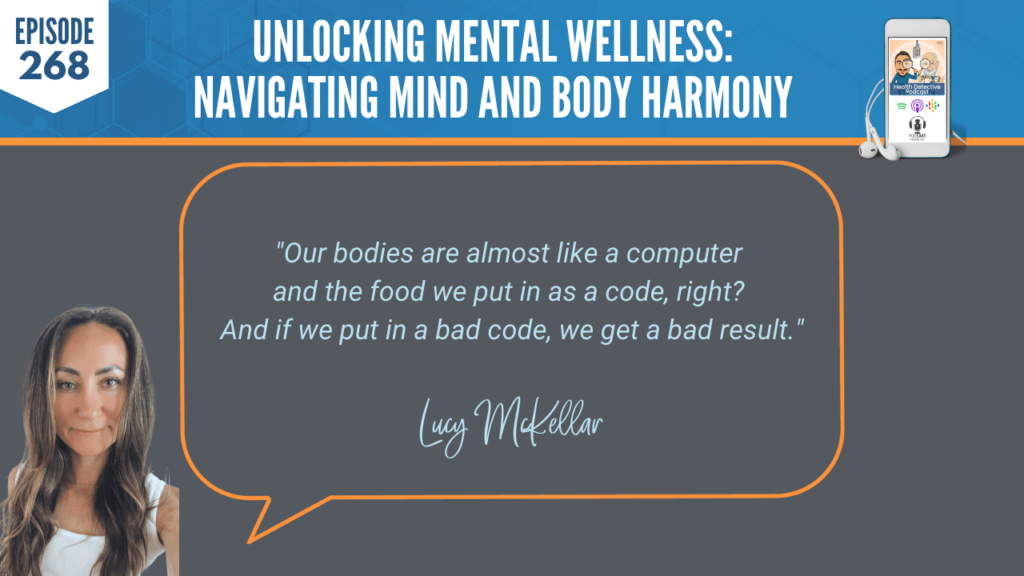
Our bodies are almost like a computer and the food we put in as a code, right? And if we put in a bad code, we get a bad result. So, if we’re putting in food that we know is not great for us, that’s what you’re going to get out. Does that make sense? I feel like I’m not explaining this very well.
Basically, I would want people to understand that when you are going to the supermarkets buying the food off the shelf, the prepackaged stuff, it’s got all these ingredients that you don’t know what they are, that has an impact on your mental health, it has an impact on your body. And I would really love people to fully grasp that and understand because I think a lot of people do not.
Conclusion
[00:47:34] Detective Ev: It makes total sense. And what I always tell people is just try it. I mean, you waste time in your life all the time. Do 30 days, say, do it for two weeks. My gosh. You’re going to feel the difference.
For two weeks just say, I’m going to eat this way. If it doesn’t work, that Detective Ev person and Lucy person were crazy. That’s fine. You can come back to us and say that. Just give it a chance to see. What do you have to lose?
Tracy said, “Amazing story and info. Lucy. Thank you for sharing.” Awesome.
You can always sign up for our Health Space Unmasked events at fdntraining.com/unmasked because we do it the first Saturday of every month.
Alright, thanks Lucy for letting me do my little advertisement. We appreciate you being here today. This was great.

You can always visit us at functionaldiagnosticnutrition.com, on YouTube @FDNtraining, or on Instagram @fdntraining.
For more informational and functional health-oriented podcasts like this one, go to functionaldiagnosticnutrition.com/health-detective-podcast/.
To learn more about us, go to functionaldiagnosticnutrition.com/about-fdn-functional-testing/.







